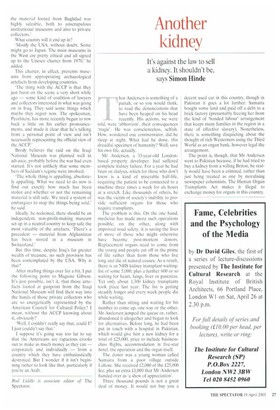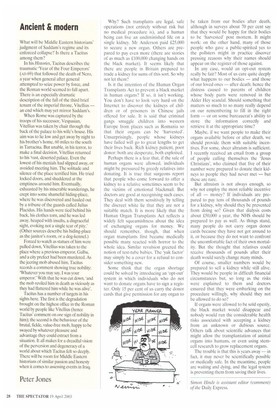Another kidney
It's against the law to sell a kidney. It shouldn't be, says Simon Hinde hor Andersen is something of a pariah, or so you would think, to read the denunciations that have been heaped on his head – recently. His actions, we were told, were 'abhorrent', their consequences 'tragic'. He was conscienceless, selfish. How, wondered one commentator, did he sleep at night. What had he done, this dreadful specimen of humanity? Well, save his own life, actually.
Mr Andersen, a 33-year-old Londonbased property developer, had suffered complete kidney failure. For a year he had been on dialysis, which for those who don't know is a kind of miserable half-life, requiring the patient to be connected to a machine three times a week for six hours at a stretch. Like thousands of others, he was the victim of society's inability to provide sufficient organs for those who require transplants.
The problem is this. On the one hand, medicine has made more such operations possible; on the other, along with improved road safety, it is saving the lives of more of those who might otherwise have become post-mortem donors. Replacement organs need to come from the young and people cut off in the prime of life rather than from those who live long and die of natural causes. As a result, there is an NHS kidney transplant waitinglist of some 5,000, plus a further 600 or so waiting for heart, lungs, liver or pancreas. Yet only about 1,300 kidney transplants took place last year. The list is getting steadily longer and every week people die while waiting.
Rather than sitting and waiting for his number to come up, one way or the other, Mr Andersen jumped the queue or, rather, abandoned it altogether and began to look for alternatives. Before long, he had been put in touch with a hospital in Pakistan, which would give him a new kidney for a total of £25,000, price to include businessclass flights, accommodation in five-star hotel, the operation and the organ itself.
The donor was a young woman called Sumaira from a poor village outside Lahore. She received £2,000 of the £25,000 fee, plus an extra £1,000 that Mr Andersen handed over as 'a show of appreciation'.
Three thousand pounds is not a great deal of money. It would not buy you a decent used car in this country, though in Pakistan it goes a lot further: Sumaira bought some land and paid off a debt to a brick factory (presumably freeing her from the kind of 'bonded labour' arrangement that keeps many families in the region in a state of effective slavery). Nonetheless, there is something disquieting about the thought of rich Westerners using the Third World as an organ bank, however legal the arrangement.
The point is, though, that Mr Andersen went to Pakistan because, if he had tried to buy a kidney from a willing Briton, he really would have been a criminal, rather than just being treated as one by moralising newspaper columnists. The Human Organ Transplants Act makes it illegal to exchange money for organs in this country. Why? Such transplants are legal, safe operations (not entirely without risk but no medical procedure is), and a human being can live an undiminished life on a single kidney. Mr Anderson paid £25,000 to secure a new organ. Others are prepared to pay even more (there are stories of as much as £100,000 changing hands on the black market). It seems likely that there are people in Britain prepared to trade a kidney for sums of this sort. So why not let them?
Is it the intention of the Human Organ Transplants Act to prevent a black market in human organs? If so, it isn't working. You don't have to look very hard on the Internet to discover the kidneys of children or of prisoners in Chinese jails offered for sale. It is said that criminal gangs smuggle children into western Europe from places such as Romania so that their organs can be 'harvested'. Unsurprisingly, people whose kidneys have failed will go to great lengths to get their lives back. Rich kidney patient, poor donor: both are desperate, both exploited.
Perhaps there is a fear that, if the sale of human organs were allowed, individuals might be pressured by greedy relatives into donating. It is true that surgeons report that people who come forward to offer a kidney to a relative sometimes seem to be the victims of emotional blackmail. But doctors are good at recognising such cases. They deal with them sensitively by telling the discreet white lie that they are not a suitable match. It is more likely that the Human Organ Transplants Act reflects a widely felt squeamishness about the idea of exchanging organs for money. We should remember, though, that when organ transplants first became medically possible many reacted with horror to the whole idea. Similar revulsion greeted the notion of test-tube babies. The `yuk factor' may simply be a cover for a refusal to consider something new.
Some think that the organ shortage could be solved by introducing an 'opt-out' system in which individuals who do not want to donate organs have to sign a register. Only 15 per cent of us carry the donor cards that give permission for any organ to be taken from our bodies after death, although in surveys about 70 per cent say that they would be happy for their bodies to be 'harvested' post mortem. It might work: on the other hand, many of those people who gave a public-spirited yes to the pollsters might in practice discover pressing reasons why their names should appear on the register of those against.
In any case, would an opt-out system really be fair? Most of us care quite deeply what happens to our bodies — and those
of our loved ones after death; hence the distress caused to parents of children whose body parts were removed in the Alder Hey scandal. Should something that matters so much to so many really depend on our remembering to fill in the right form — or on some bureaucrat's ability to store the information correctly and retrieve it at the appropriate time?
Maybe, if we want people to make their organs available before or after death, we should provide them with suitable incentives. For some, sheer altruism is sufficient. I recently received an email from a group of people calling themselves the 'Jesus Christians', who claimed that five of their number were prepared to donate their kidneys to people they had never met — but these are rare.
But altruism is not always enough, so why not employ the most reliable incentive of all — money? If individuals are prepared to pay tens of thousands of pounds for a kidney, why should they be prevented from doing so? Given that dialysis costs about £50,000 a year, the NHS should be prepared to pay as well, As things stand, many people do not carry organ donor cards because they have not got around to it, or because they do not want to confront the uncomfortable fact of their own mortality. But the thought that relatives could receive thousands of pounds after their death would surely change many minds.
Of course, smaller numbers would be prepared to sell a kidney while still alive. They would be people in difficult financial circumstances but, so long as the risks were explained to them and doctors ensured that they were embarking on the procedure willingly, why should they not be allowed to do so?
If organs were allowed to be sold openly, the black market would disappear and nobody would run the considerable health risks associated with accepting a kidney from an unknown or dubious source. Others talk about scientific advances that might allow the transplantation of animal organs into humans, or even using stemcell research to grow replacement organs.
The trouble is that this is years away — in fact, it may never be scientifically possible or medically safe. In the meantime, people are waiting and dying, and the legal system is preventing them from saving their lives.
Simon Hinde is assistant editor (comment) of the Daily Express.



































































 Previous page
Previous page